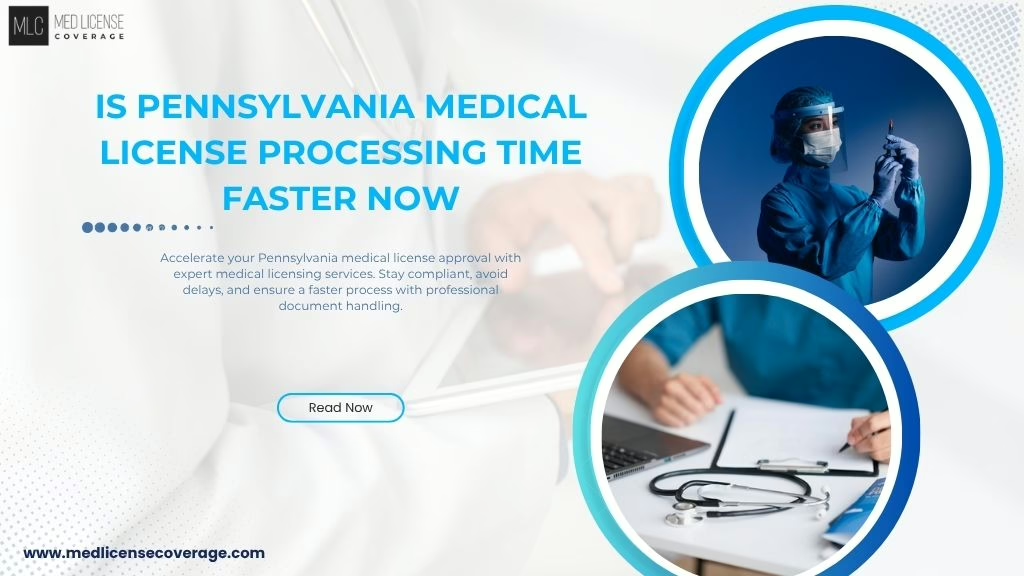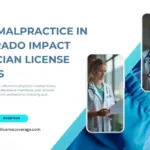Pennsylvania medical license processing time has become a vital worry for healthcare experts. Getting licensed quickly supports nonstop practice and secure work. Today, licensing boards manage hundreds of demands. As demand expands, the process needs to adapt. Prompt licensing allows easy entry into clinics and healthcare facilities.
Understanding the Pennsylvania Medical License Processing
The process of obtaining a Pennsylvania medical license entails multiple steps. Applicants must submit education verification, training verification, criminal background checks, and more. Every application must be accurate and complete. If documents are incorrect or missing, the timeline prolongs.
License Processing time in Focus
Previously, Pennsylvania medical license processing time could stretch to several months. Recently, regulatory departments have worked to speed up the process. Today, typical timelines range from 8 to 12 weeks. For some, it may take longer depending upon the document issues.
Factors That Affect Processing Time
Numerous aspects affect how much time it takes:
-
- Application completeness
-
- Response time from medical institutions and health centers
-
- Background check delays
-
- Errors in submitted forms
Each hold-up adds to the general time. Timely actions from all involved parties reduce issues.
Role of Medical Licensing Providers
Medical licensing services help streamline the entire procedure. These services take care of documentation, collect required records, and ensure compliance. They understand state-specific regulations, including Pennsylvania’s. They verify that every demand is addressed, preventing denial or revision.
When using medical licensing services, professionals often experience much shorter wait periods. Their assistance helps avoid errors, speeds up verification, and alleviates the concern of applicants.
Comparing with New York Medical Certificate Timelines
Pennsylvania isn’t the only state improving processes. The processing time for medical licenses in New York has also increased over the last few years. However, Pennsylvania’s average processing time is still significantly faster, depending on the flow of documentation.
Medical licensing solutions track timelines throughout states. They see changes quickly. Applicants in numerous states benefit from this understanding. It helps better preparation and job placement.
Digital Tools and Improvements
Online systems currently support the submission and updating of forms. Pennsylvania licensing boards utilize secure online portals for application monitoring. Digital submission lowers manual documents and accelerates reviews.
Medical licensing solutions utilize these systems effectively. They manage applications, upload information, and closely monitor the condition of the data. This real-time access adds effectiveness.
Background Checks and Hold-ups
Background checks frequently create delays. Fingerprint results and disciplinary document assessments take some time. More detail is required if flagged individuals are involved. Certain cases necessitate obtaining information from former companies or institutions.
Medical licensing solutions provide follow-up on these checks. They determine if the history check firms are going to call the board officials, guaranteeing it along the way.
Credentialing ties to licensing.
When a permit is provided, hospital credentialing begins. Without a valid license, the credentialing process can not proceed. Credentialing consists of certificate confirmation, peer reference checks, and negligence reviews.
Medical licensing services connect both actions. After permit approval, they submit papers directly to healthcare facility hospital credentialing departments. This transition keeps hiring and onboarding on the right track.
Additional Requirements with Extended Timelines
International grads, or those who studied outside the U.S., often encounter extra steps. They should send equivalency reports and English efficiency tests. These instances expand Pennsylvania medical certificate handling time.
Medical licensing services support these steps with managing all these complications. They will arrange necessary documents early. Such preparation will help prevent unnecessary delays.
License Renewals and Reinstatement
Renewal timelines follow a schedule in Pennsylvania. Expired licenses will need to be reinstated. The reinstatement process will include an even further review. It can include CME audits, ethics reviews, and practice history reviews.
Medical licensing services guide applicants through these steps. Their experience lowers complications and mistakes. This approach is particularly beneficial for doctors returning after a practice gap.
Impact of the Pandemic and Recovery
The COVID-19 pandemic caused delays in licensing timelines across all states. Short-term waivers were provided. Currently, as systems stabilize, standard rules are being reinstated. In Pennsylvania, application volume stays high.
Despite this, processing time has actually improved as a result of the electronic makeover and improved personnel control. Many Medical boards have actually updated systems to manage needs.
Fast Track Options
Some applicants receive expedited handling. This consists of:
-
- Armed forces spouses
-
- Physicians move within a compact of accepted states.
-
- Specialists in shortage locations
Medical licensing solutions determine these pathways. They file appropriately and ask for a request for expedited review. This choice decreases wait time dramatically.
What Assists Accelerate Handling?
To reduce Pennsylvania medical permit handling time, guarantee:
-
- The application forms are total.
-
- All required documents are submitted upfront.
-
- There are no errors in the name, address, or dates provided.
-
- History check requests are submitted early
Medical licensing services examine all information. They preserve interaction with colleges, past companies, and state boards. This approach makes for a clean, full submission.
Conclusion
The time needed to process Pennsylvania medical license applications is improving. With better systems and now electronic support, the process has improved greatly. Medical licensing services improve this process using in-person and electronic methods; delays often result from paperwork and state requirements. Medical licensing services speed up the movement from initial applications to active credentials, ensuring a smooth process. Most specialists needing valid licenses benefit from this new approach. In today’s health care society, rapid and accurate licensing is more important than ever.







